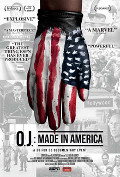
Directed by
Ezra Edelman
467 minutes
Rated MA
Reviewed by
Chris Thompson

OJ: Made In America
Synopsis: It’s twenty years since the world was gripped by O.J. fever; fascinated with the circumstances surrounding the brutal murder of Nicole Brown Simpson, the police chase of OJ’s white Bronco down an LA freeway, the questions about the blood in the car and the second glove at the OJ’s home and, of course, the verdict. This comprehensive documentary not only provides a definitive retelling of all these events, but does so in the context of the wider racial issue of black and white relations in America, revisiting the police beating of Rodney King and many other key race-related incidents along with the issues that fuelled the LA riotsin order to give a deeper meaning to the circumstances of the O.J. verdict. Hours of archival footage, courtroom videos and more than 70 interviews with long-time friends and colleagues of Orenthal James Simpson as well as those involved with the murder investigation and subsequent trials are woven together to provide fascinating insight into both the O.J. story and its wider ramifications.
Bit by bit the lines are blurring and it seems like the hold of the big screen is slowly being eroded by its smaller, ubiquitous cousins. Just this week, Netflix set the cat among the pigeons at Cannes by having two of its small screen movies included in the offerings (much to the chagrin of Pedro Almodóvar and others) whilst at this year’s Oscars, a seven and a half hour five-part mini-series managed to take out the Best Documentary award on the technicality of having been screened in its entirety at Sundance (the Academy has, of course, quickly moved to close the loophole that allowed this, but one can’t help feeling that the writing is on the wall – or perhaps that should be on the small screen).
It’s just as well, then, that the Oscar winner in question – OJ: Made in America – is a towering achievement, not just in its epic scale, but in its capacity to extend the tragic and shocking tale of this sporting icon into a parable about race, celebrity, power and the inequities of American society, culture and its criminal justice system at the turn of the century. I will admit to not having made it past the second episode of The People v O.J Simpson: American Crime Story; the FX dramatic version of this story with John Travolta’s over the top make-up (and performance to go with it) and Cuba Gooding Jnr’s histrionics, but where that series played up the sensations of the story, this documentary digs deeper into its underlying meaning in relation to a country where wealth and notoriety can, literally, provide you with a get-out-of-jail-free card.
Ezra Edelman's documentary provides us with a compelling insider’s view on the hows and whys of a remarkable series of events. The long running time (I didn’t do it in one sitting!) might seem excessive during the first couple of hours until it becomes clear how important it is for the audience to be immersed in both O.J.’s life and the public’s adoration of him up until (and in many cases beyond) the murder of his estranged wife. Equally, the next couple of hours are important in enabling us to understand the highly flammable social and racial environment of those years, the overwhelming hero worship of O.J. by white culture and its impact on his highly successful career in advertising and endorsements and, curiously, his determination to ignore the cause of civil rights in favour of his colourblind view of his own entitlement and place in society.
By the time we get to the trial, we’re are well schooled in the societal implications of the case and much better equipped to be more than passive observers of the fascinating manoeuvrings of the defence case and the seeming ineptitudes of the prosecution. When the final hour or so brings us to the gobsmacking stupidity and hubris of O.J.’s post-trial years, I have to say that I would willingly have gone another couple of hours if the story being told was as gripping and edifying as the previous seven and half. Of course, the doco’s producers are now rebadging their ‘feature documentary’ as a television mini-series in time for the Emmys. It would be surprising for a doco to win both an Oscar and an Emmy, but it wouldn’t be surprising to me if it was this film that pulled it off.

Want more about this film?


Want something different?




